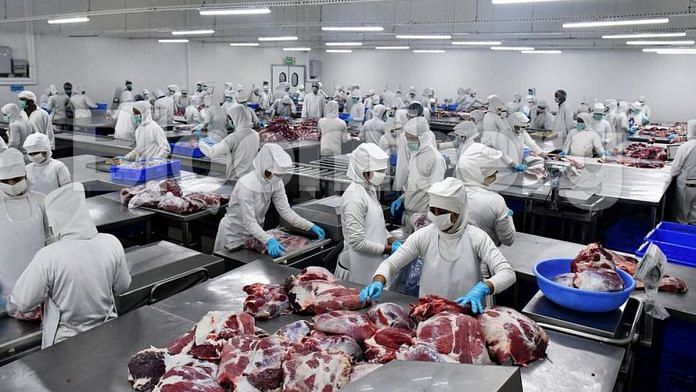China’s attempts to stop the spread of African swine fever are closing the door on a black market meat trade that’s normally worth about $2 billion a year.
Stricter controls at China’s borders have slashed the amount of unofficial produce being imported into the country through its immediate neighbors. That includes as much as 2,000 containers of buffalo meat that Indian herders ship to China every month via Vietnam to circumvent an 18 year ban by Beijing.
Sales have halved since the borders were tightened last year when African swine fever was discovered in China, with buffalo shipments via Vietnam now down to about 1,000 containers a month, according to the All India Meat and Livestock Exporters Association. The group wants Beijing to allow India to sell directly to China again, saying that will help alleviate an impending protein shortage there.
“It’s extremely crucial and important to get direct access to the Chinese market,” said Fauzan Alavi, the vice president of the association. “Access through Vietnam is extremely erratic. We are requesting for direct access as it will be beneficial for Chinese consumers in terms of quality and pricing.”
Also read: Why are so many people getting a meat allergy?
China banned imports of meat from all cloven-hoofed animals from India following an outbreak of foot-and-mouth disease in 2001. The disease, which affects animals including buffalo, cattle and sheep, is present in China and India. The South Asian nation has an extensive vaccination program in place to try and control it. China’s customs administration declined to comment.
“Authorities have been strictly checking imports and meat smuggling has been falling,” Feng Yonghui, the chief analyst with industry portal soozhu, said in an interview. “The livestock industry could not suffer another blow after the outbreak of swine fever.”
Feng said smuggled meat is mainly sold to processing plants, which turn it into cooked products.
The sharp decline in overseas sales is another blow to meat exporters in India as their very existence is questioned at home by Hindu nationalists. Growing competition from traditional beef exporters such as Australia and Brazil has also curbed the industry, with the nation’s buffalo meat shipments down about 25% from their peak in 2014 to 1.56 million metric tons last year, according to the U.S. Department of Agriculture data.
To see more on how African swine fever is reshaping global meat markets, click here
The slump in demand has seen buffalo meat prices in India drop to $3.10 to $3.20 kilogram, compared with prices of about $5 in China, Alavi said. Before African swine fever, as much as 98% of the buffalo meat that India exported to Vietnam was reshipped to China, with the market accounting for more than half of India’s total exports in 2017-18, he said.
China’s “unofficial” bovine imports are estimated at about 1 million metric tons a year, with Hong Kong and Vietnam among the largest entry points.
One bright spot for the Indian exporters is that swine fever is also reshaping Vietnam’s meat consumption. That’s increased its domestic demand for buffalo and beef. India’s exports for that market have climbed about 30%, Alavi said.
While buffalo meat is selling for about $3.30 to $3.50 a kilogram in Vietnam, it’s still more expensive than the $2.20-$2.40 for pork, but its popularity is growing because of swine fever, said Alavi, who’s also a director with Allanasons Pvt., India’s biggest buffalo meat exporter.



